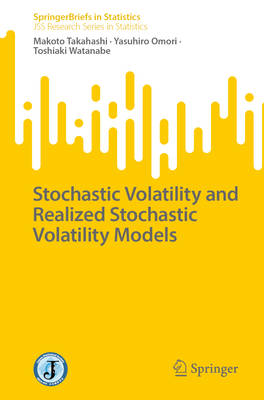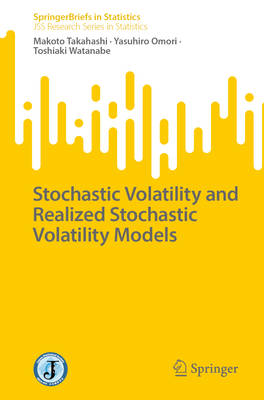
- Afhalen na 1 uur in een winkel met voorraad
- Gratis thuislevering in België vanaf € 30
- Ruim aanbod met 7 miljoen producten
- Afhalen na 1 uur in een winkel met voorraad
- Gratis thuislevering in België vanaf € 30
- Ruim aanbod met 7 miljoen producten
Stochastic Volatility and Realized Stochastic Volatility Models
Makoto Takahashi, Yasuhiro Omori, Toshiaki WatanabeOmschrijving
This treatise delves into the latest advancements in stochastic volatility models, highlighting the utilization of Markov chain Monte Carlo simulations for estimating model parameters and forecasting the volatility and quantiles of financial asset returns. The modeling of financial time series volatility constitutes a crucial aspect of finance, as it plays a vital role in predicting return distributions and managing risks. Among the various econometric models available, the stochastic volatility model has been a popular choice, particularly in comparison to other models, such as GARCH models, as it has demonstrated superior performance in previous empirical studies in terms of fit, forecasting volatility, and evaluating tail risk measures such as Value-at-Risk and Expected Shortfall.
The book also explores an extension of the basic stochastic volatility model, incorporating a skewed return error distribution and a realized volatility measurement equation. The concept of realized volatility, a newly established estimator of volatility using intraday returns data, is introduced, and a comprehensive description of the resulting realized stochastic volatility model is provided. The text contains a thorough explanation of several efficient sampling algorithms for latent log volatilities, as well as an illustration of parameter estimation and volatility prediction through empirical studies utilizing various asset return data, including the yen/US dollar exchange rate, the Dow Jones Industrial Average, and the Nikkei 225 stock index. This publication is highly recommended for readers with an interest in the latest developments in stochastic volatility models and realized stochastic volatility models, particularly in regards to financial risk management.Specificaties
Betrokkenen
- Auteur(s):
- Uitgeverij:
Inhoud
- Aantal bladzijden:
- 113
- Taal:
- Engels
- Reeks:
Eigenschappen
- Productcode (EAN):
- 9789819909346
- Verschijningsdatum:
- 19/04/2023
- Uitvoering:
- Paperback
- Formaat:
- Trade paperback (VS)
- Afmetingen:
- 154 mm x 232 mm
- Gewicht:
- 158 g

Alleen bij Standaard Boekhandel
Beoordelingen
We publiceren alleen reviews die voldoen aan de voorwaarden voor reviews. Bekijk onze voorwaarden voor reviews.











